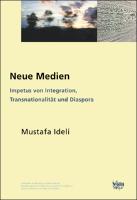Neue Medien
Impetus von Integration, Transnationalität und Diaspora
Author(s)
Ideli, Mustafa
Collection
Swiss National Science Foundation (SNF)Language
GermanAbstract
Along with the worldwide growing mobility and migration, the scientific studies and political-public debates are increasingly more concerned with the questions of motivation and manner in which modern information and communication technology is used by people with a migration background as well as the resulting consequences for the individual as a user on the one hand, and the ethno-cultural groups in migration, the home and residence societies, on the other hand. The researches focus on the questions about the importance of the use of the mentioned media technologies in the development of transcultural / -national communication / interaction relations across national borders and in the (re-)formation of cultural identities. Another central issue is the question of the role of media use in everyday orientation and multipole integration as well as participation efforts. Based on these goals, this empirical-comparative dissertation study, which is based on interviews with around 930 people, in particular explores the possible interrelationships between affiliation with ethnic and ethno-religious minorities in the context of migration and the motivation of the use of classical and, especially, new media by the people living in Switzerland with a migration background from Turkey - under specific consideration respectively differentiation according to ethnic and religious subgroups of Alevis, Assyrian, Kurds and Turks.
Keywords
integration; new media; emigration; assimilation; media offerDOI
10.33058/seismo.30742ISBN
9783037772003Publisher
SeismoPublication date and place
2020Series
Sozialer Zusammenhalt und kultureller Pluralismus,Classification
Migration, immigration and emigration
Relating to migrant groups / diaspora communities or peoples


 Download
Download Web Shop
Web Shop